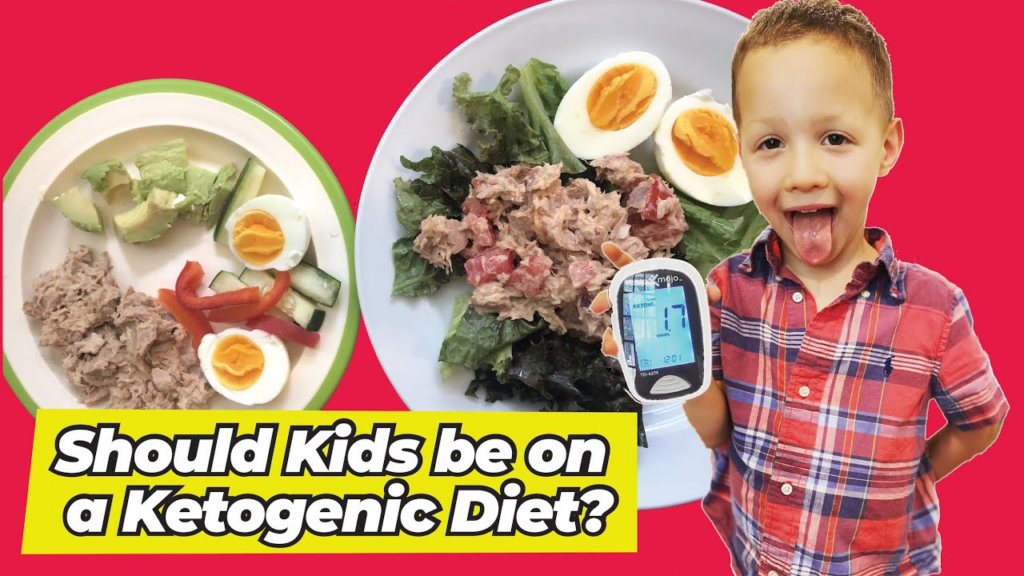Keto for Kids: The ketogenic diet has become increasingly popular in recent years for losing weight, improving health, and treating certain medical conditions. This low-carb, high-fat diet puts the body into ketosis, burning fat for energy instead of carbs.
While the keto diet offers proven benefits for adults, there are concerns about its safety and effectiveness for children and teens. This article provides an in-depth look at the uses and potential risks of the ketogenic diet for kids.
What is the Ketogenic Diet?

The ketogenic diet typically limits carbs to 20-50 grams per day.
This forces the body to burn fat for fuel instead of carbs through ketosis.
On keto, the macronutrient ratio looks like this:
60-75% of calories from fat
15-30% of calories from protein
5-10% of calories from carbs
Foods like meat, eggs, full-fat dairy, oils, nuts, seeds, and low-carb vegetables are emphasized. Foods high in carbs like grains, legumes, fruits, sweets, and starchy vegetables are restricted.
The keto diet should be distinct from a simple low-carb diet. Achieving and maintaining ketosis requires strict carb restriction, adequate protein, and high fat intake.

Uses of Keto for Kids
The ketogenic diet has two primary therapeutic uses in pediatric medicine: treating drug-resistant epilepsy and as an adjuvant therapy for brain cancer.
Epilepsy
Since the 1920s, the keto diet has been used to treat epilepsy in children. It has consistently reduced seizure frequency and severity significantly when other medications have failed.
Multiple theories may explain why keto helps control seizures:
- Ketones provide an alternative energy source to glucose
- Ketosis affects neurotransmitters and ion channels
- Ketosis has antioxidant and anti-inflammatory effects
According to studies, the diet reduced seizures by over 50% in half of pediatric patients with refractory epilepsy. 30-40% of children had a 90% reduction in seizures.
The ketogenic diet is usually prescribed for 1-2 years. After this period, 30-60% of children can continue seizure control after increasing carbs. The diet is discontinued if ineffective after 3-6 months.
Brain Cancer
The high-fat keto diet may also have anti-tumor effects by limiting glucose availability to tumor cells. Small studies suggest it could be a beneficial adjuvant treatment for deadly pediatric brain tumors like glioblastoma.
Combined with drugs or radiation, keto may help slow tumor progression and enhance survival. However, more research is still needed, especially regarding long-term outcomes.
The diet is an experimental adjuvant therapy and should not replace standard medical treatment.
Less Restrictive Versions
Modified versions of the ketogenic diet are sometimes used as an alternative treatment for epilepsy in kids. These include:
- The modified Atkins diet Allows more protein, fluids, and calories. 10-20 grams of net carbs per day.
- The low glycemic index treatment Focuses on carb sources that minimally impact blood sugar.
- The modified ketogenic diet: A 3:1 ratio instead of a 4:1 ratio of fat to carbs/protein.
These less restrictive versions may improve compliance, retention, and side effects. However, classical keto remains the gold standard treatment. Combining

Implementing the Diet for Medical Uses
When prescribed for medical conditions, the keto diet for kids is closely monitored by a team that includes a physician, dietitian, and nurse. It typically involves:
- Medical workup: Physical exam, lab tests, ECG, etc.
- Consultation with dietitian: Meal planning and micronutrient evaluation
- Hospital admission for keto initiation: Gradually increase dietary fat and restrict carbs over three days.
- Liquid formula only for the first few days
- Education for the family on meal prep, testing ketones, managing side effects
- Follow-up visits for fine-tuning and monitoring
A 3:1 ratio of fats to carbs and protein is often used for infants instead of the classic 4:1 ratio. Toddlers may do well with a 2:1 or 1:1 ratio.
Adherence to the strict keto protocol is critical for therapeutic efficacy and safety. Close medical supervision helps minimize risks and side effects.
Potential Side Effects and Risks
The highly restrictive keto diet carries more risks in children than adults due to their unique nutritional needs for growth and development. Potential adverse effects include:
Short-Term Side Effects
- Hypoglycemia
- Dehydration and constipation
- Gastrointestinal distress
- Lethargy and weakness
- Mineral deficiencies
Long-Term Concerns
- Impaired growth
- Disordered eating habits
- Increased LDL cholesterol
- Kidney stones
- Nutrient deficiencies
- Liver problems
Most side effects are mild and can be managed under medical supervision. However, they may limit retention and adherence. Less restrictive modified ketogenic diets may have better compliance and fewer side effects.

Safety in Healthy Children
The therapeutic keto diet is strict to follow long-term without medical necessity. It eliminates entire food groups, which may harm a child’s nutritional status.
Aside from medical treatment, the diet is generally not recommended for healthy children due to risks including:
- Inadequate intake of vitamins, minerals, fiber
- Impairing growth and development
- Creating unhealthy relationships with food
- Lack of scientific support for use in weight management
With obesity rates rising in kids, low-carb eating may seem appealing. But more balanced plans like the Mediterranean diet are healthier and sustainable.
The keto diet is too restrictive as a general approach for healthy children. Unless prescribed for medical reasons, it is best avoided

Keto for Weight Loss in Kids
Child and adolescent obesity has tripled over the past 30 years. This is concerning given complications like metabolic syndrome, joint problems, and psychosocial effects.
Some view keto as an effective weight loss strategy for youth based on potential benefits like:
- Appetite suppression from ketosis
- Lower insulin levels
- Increased fat burning
However, evidence directly supporting keto for pediatric weight loss is lacking. Potential downsides are significant, including:
- Impaired growth and puberty
- Nutrient deficiencies
- Disordered eating patterns
- Social isolation
- High dropout rates
A significant risk is perpetuating unhealthy relationships with food that can lead to eating disorders. Teens with obesity are already at greater risk for disorders like anorexia, bulimia, and binge eating disorder.
For children struggling with obesity, a nutritionally balanced reduced-calorie diet combined with lifestyle changes is the healthiest approach. The keto diet should be avoided outside of rare medical situations.
Frequently Asked Questions
What are the medical uses of keto for children?
The keto diet has been used since the 1920s to treat drug-resistant epilepsy in children successfully. More recently, it has been explored as an experimental adjuvant treatment for certain brain cancers like glioblastoma.
Is the keto diet safe for healthy kids?
No, the keto diet is not recommended for most healthy children outside of medicinal use. It is too restrictive and can impair growth, nutrition, and relationship with food during crucial developmental windows.
Does keto help kids lose weight?
There is limited evidence on keto for weight loss in children. While it may result in short-term weight loss, there are concerns about negative impacts on growth, metabolism, eating behaviors, and adherence. More balanced, reduced-calorie diets are recommended.
What are the risks and side effects?
Potential side effects include dehydration, constipation, nutrient deficiencies, kidney stones, higher LDL cholesterol, impaired growth, disordered eating behaviors, and social isolation. Close medical monitoring is required.
Should teens follow keto to lose weight?
No, keto is not advised for teens seeking weight loss. Nutritionally balanced plans and lifestyle changes are safer and more sustainable. Keto may increase the risk of eating disorders.
Are modified versions better for children?
Less restrictive versions like the modified Atkins diet may be preferable to classic keto for kids. They liberalize protein, fluids, calories, and carbs, improving adherence and side effects.
The Bottom Line
The ketogenic diet can be a life-changing medical intervention for pediatric epilepsy and cancer under close medical guidance. For these conditions, keto provides remarkable benefits that likely outweigh the risks.
However, for healthy children and teens, the highly restrictive nature of the diet makes it inappropriate and potentially unsafe. Impacts on growth, nutrition, and long-term eating habits are significant concerns.
Unless prescribed and monitored by a pediatric specialist, the keto diet should be avoided in kids. A balanced, nutrient-dense whole foods diet supports healthy growth and development.






[…] Keto for Kids Explore the ins and outs of the ketogenic diet for children. Discover its benefits, challenges, and kid-friendly keto recipes. A comprehensive guide for parents considering low-carb diets for their young ones. […]